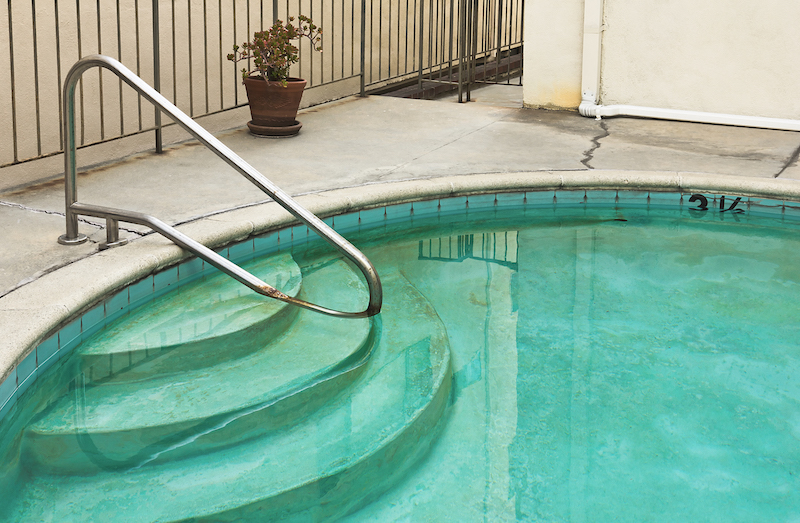Keeping your swimming pool in pristine condition means you can look forward to using it whenever you want. When your pool develops unsightly stains, though, you might be hesitant about jumping in. It’s important to determine what’s causing these stains and how to remove them. If your pool has stains that have a bluish-green color, these are usually copper stains. When you see stains that are reddish-brown, your pool might have iron stains. These metal stains differ from organic stains caused by algae and other organic matter.
Keep in mind that copper and iron stains can also develop in hot tubs and spas. Any exposure to these metals, such as copper pipes or deck materials containing iron, can cause these stains to occur. Preventing metal staining from developing helps keep your swimming pool, spa, or hot tub in good condition, while also protecting its appearance.
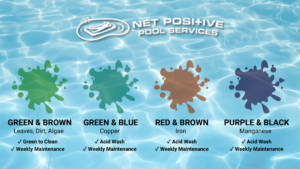
Understanding Copper and Iron Stains
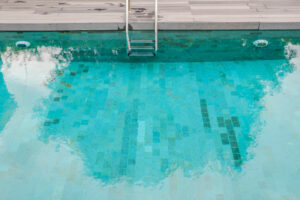
Copper Stain Causes
Where do copper stains come from? These stains can develop when your pool has worn pieces of plumbing. When copper pipes deteriorate, this metal can leach into your pool water. The use of copper-based algaecides, copper sulfate blocks, and low-quality pool salt can also lead to copper staining. These products add copper ions to the pool water. A pH that’s too high can result in these unsightly stains as well. A high pH can cause copper ions to stick to a pool wall or other pool surface.
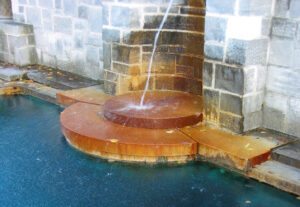
Symptoms of Copper Stains in Pool
How can a pool owner tell if copper stains are present? These stains often have a bluish-green appearance, so it’s easy to mistake them for algae. Shocking your swimming pool to get rid of algae can then cause copper oxidation, resulting in copper stains with darker coloring. Even if you don’t shock your pool, you can expect these stains to become darker over time.
Iron Stain Causes
What causes iron staining in pools? This type of pool stain can develop when you have iron pool heater headers that weren’t installed correctly. The materials used in pool decking, fencing, and other pool components can also cause iron stains to form. For example, granite and marble contain iron. This mineral can leach into the pool water, leading to iron staining, especially if these materials haven’t been fully or properly waterproofed. Well water is another possible cause of iron stains since it has high amounts of this mineral. Keep in mind that any type of pool can end up with a rust stain or two, including a fiberglass pool or concrete pool.
Symptoms of Iron Stains
What do iron stains in pools look like? These stains sometimes look like rust spots due to their reddish-brown coloring. However, they can also appear as yellowish, greenish, or dark brown stains. The coloring varies depending on how much iron there is, what type of pool surface it’s on, and how long it’s been there. You’re more likely to find these stains in certain places, such as areas that aren’t brushed as often or areas that don’t get as much circulation.
Preventing Copper and Iron Stains
Although dissolving metals and other causes can lead to copper or iron stains, there are ways to prevent this from happening. Every pool owner can take steps to reduce the risk of having these metal stains develop on pool surfaces. Doing this helps ensure that your pool, spa, or hot tub looks its best, while also being ready to use.

Maintain Proper Water Chemistry
Pool water needs to maintain total alkalinity and the right pH level in order to prevent stains. A pH level below seven is considered low, which makes the water acidic. This can cause copper or iron stains from dissolved metals. Acidic pool water can also cause pitting in surfaces, causing metals inside these materials to leach into the water. A pH level above eight is considered high, which causes metal ions in water to bond to surfaces and form stains. Pool water needs to have enough calcium hardness and alkalinity to reduce the risk of stains. Adding sodium bicarbonate can help raise low alkalinity while adding sodium bisulfate or muriatic acid can help decrease high alkalinity.
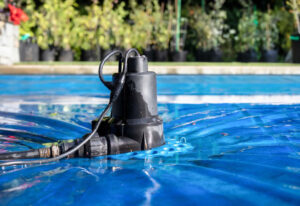
Choose the Right Pool Products
Maintaining proper pool chemistry is a good first step toward preventing stains. However, it’s just as important to reduce the amount of metal that gets into pool water. When choosing pool chemical products or other pool products, avoid purchasing ones that contain copper or iron. Doing this helps lower the amount of metal in your pool overall, reducing the risk of having stains develop.
Use Metal Sequestering Agents
Metal sequestering agents prevent the metal in pool water from being able to stick to surfaces. These agents combine with copper or iron to form molecules that hold these heavy metal ions in place securely. This stops the ions from bonding to pool walls and other surfaces. Keep in mind that sequestering agents only provide a short-term solution for preventing stains. They don’t physically remove metals from water.
Brush the Pool’s Surface Regularly
Brushing surfaces in your pool on a regular basis helps lower the risk of having iron or copper staining occur. This cleaning technique stops these metals from settling onto pool surfaces and forming stains. Regular brushing will also help protect against organic pool stains from algae and other organic debris, so your pool stays cleaner overall.
Install a Pool Filter That Removes Metal
Copper and iron are tiny particles that regular or standard pool filters won’t remove. Consider installing a pool filtration system that is designed to remove metal particles. Keeping metal out of your pool water as much as possible helps reduce the risk of having stains develop.
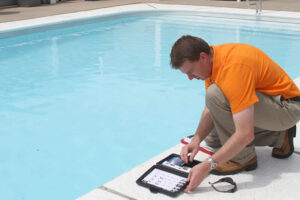
Treating Copper and Iron Stains
What should you do if you already have copper or iron stains in your pool? Pool owners can take the following steps to handle this type of staining and restore their pool’s appearance.
Identify the Stain
The right way to handle stain removal depends on the kind of stains your pool has and how severe they are. Getting rid of severe or tough stains might require a different approach compared to eliminating mild stains. How can you tell which type of stains you have? A metal test kit can determine this, although these kits are typically expensive. Another way to test involves placing chlorine tablets on stains. Organic stains should become lighter or fade entirely. These tablets won’t affect metal stains. You can also place ascorbic acid on stains to test them. Sprinkle crushed vitamin C tablets on stains. If they fade or lighten, this indicates that you have metal stains that are most likely iron. The color of pool stains can help you get an idea of whether they’re copper or iron.
Use the Right Stain Remover
Once you know what you’re dealing with, you can apply a stain remover. Make sure you get the appropriate kind of stain remover for iron or copper pool stains. For example, ascorbic acid might work as an iron stain remover. However, it might not work on copper stains.
Keep in mind that many stain treatments will not remove the metals from your water. When it comes to long-term solutions, you should turn to professionals to remove both the stain and the metal in your pool water.
Seek Professional Help
If your pool has developed tough stains, especially in multiple areas, a professional pool company can help. The stain removal method a pool company uses will depend on the type of pool material you have and the kind of stains your pool has.
For concrete, stone, and tiled surfaces, an acid wash might offer the most effective way to remove stains. This process involves draining the pool and applying muriatic acid to surfaces in order to eliminate stubborn stains. Acid washing must be done carefully to avoid damaging your pool, which is why it’s best to leave it to the professionals.
Schedule Pool Maintenance on a Weekly Basis
When your pool is clean and stain-free, set up weekly pool cleaning and maintenance. This service helps prevent copper and iron stains from developing again. Weekly maintenance is also an important part of keeping your swimming pool in excellent condition and reducing the risk of wear and tear. Make sure you choose a reliable pool company with experience handling pool maintenance and cleaning.
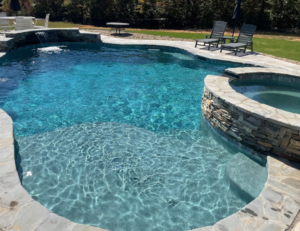
Pool Cleaning & Maintenance for Huntersville, Greenville, & Statesville Pools
If copper and iron stains are keeping your family from enjoying your pool, turn to the experts at Net Positive Pools. Our team is made up of the most experienced and trustworthy technicians to ensure a quality clean. Whether you’re looking for a one-time deep clean, repair, or installation or you’re interested in weekly maintenance that keeps your pool water consistently balanced, Net Positive Pools is here to help.
To learn more about our pool cleaning, repairs, and maintenance, contact us today! We serve pool owners in the Huntersville, Statesville, and Greenville areas.
